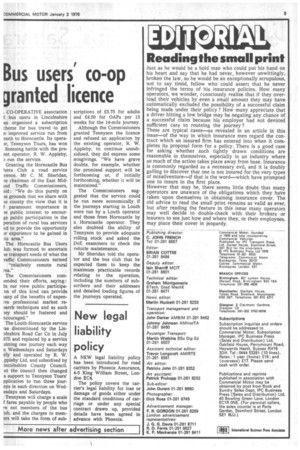Reading the small print
Page 7

If you've noticed an error in this article please click here to report it so we can fix it.
Just as he would be a bold man who could put his hand on his heart and say that he had never, however unwittingly, broken the law, so he would be an exceptionally scrupulous, not to say timid, fellow who could assert that he never infringed the terms of his insurance policies. How many operators, we wonder, consciously realise that if they overload their vehicles by even a small amount they may have automatically excluded the possibility of a successful claim being made under their policy ? How many appreciate that a driver hitting a low bridge may be negating any chance of a successful claim because his employer had not devoted sufficient care to routeing the journey ?
These are typical cases—as revealed in an article in this issue—of the way in which insurance men regard the contract which an insured firm has entered into when it completes its proposal form for a policy. There is a good case for asking whether such tightly drawn conditions are reasonable in themselves, especially in an industry where so much of the action takes place away from base. Insurance is commonly regarded as a necessary evil, and it is doubly galling to discover that one is not insured for the very types of misadventure—if that is the word—which have prompted one to insure in the first place.
However that may be, there seems little doubt that many operators are unaware of the obligations which they have taken upon themselves in obtaining insurance cover. The old advice to read the small print remains as valid as ever, but after reading the feature in this issue many operators may well decide to double-check with their brokers or insurers to see just how and where they, or their employees, may place their cover in jeopardy.




































































